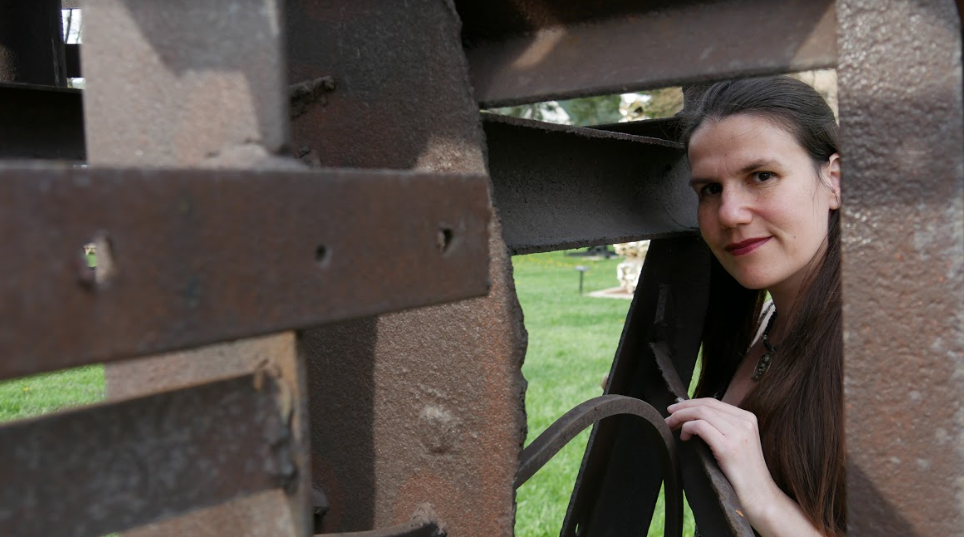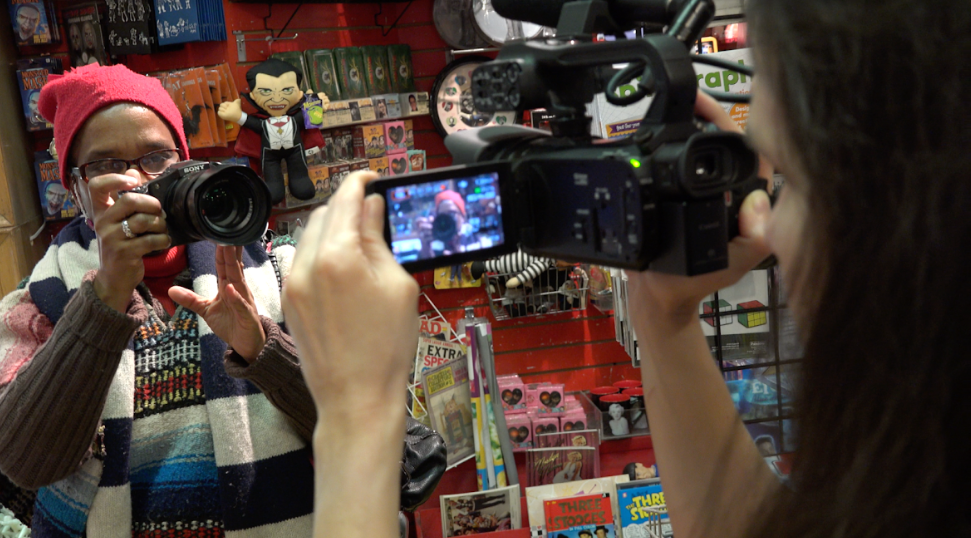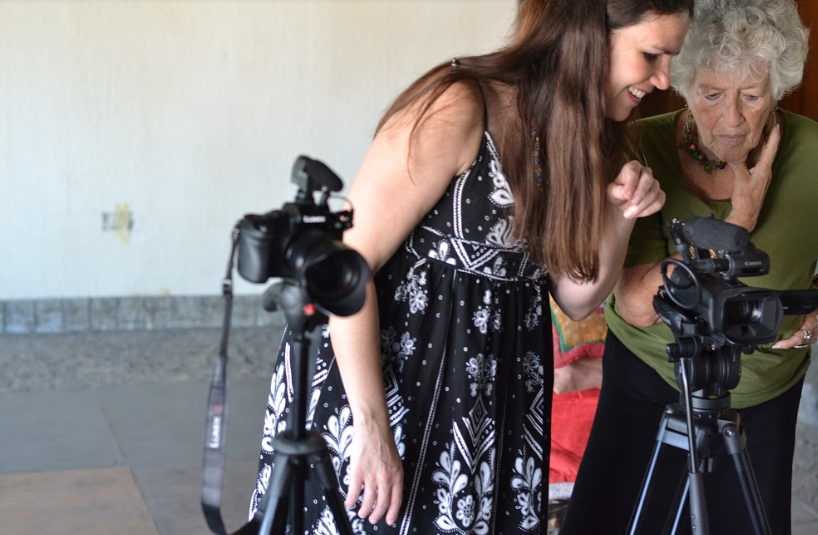Revisiting Familiar Places and Exploring New Spaces

The name Alexandra Hidalgo may be familiar to those of you who are familiar with our books. Her video book, Cámara Retórica: A Feminist Filmmaking Methodology for Rhetoric and Composition, was published in January of 2017 by our press and shows readers how they can re-vision composition. In her introduction Hidalgo explains that the book is:
“comprised of six video-essay chapters that connect film and video production, feminist filmmaking, and Rhetoric and Composition. Drawing from interviews conducted with ten faculty and graduate students in the field who produce and teach the production of moving images, as well as original footage and clips created by rhetoricians and filmmakers, Cámara Retórica weaves a visual and aural tapestry that performs the kind of feminist, moving-image scholarship it argues can be transformative for Rhetoric and Composition.”
Recently at the Computers and Writing Conference at George Mason University in Virginia, Cámara Retórica was awarded the Computers and Composition Distinguished Book Award, which “honors book-length works that contribute in substantial and innovative ways to the field of computers and composition.”

Hidalgo describes the difficulty many scholars feel when asked to define their scholarship, which oftentimes combines a variety of interests into a niche they feel compelled to work on. Those niches, which do not quite fit perfectly into the various fields, make for delightful study but also result in unease as those fields can tug at scholars to declare their allegiance. Hidalgo writes,
“Since the first year of my PhD, I have been straddling two fields: rhetoric and composition and documentary filmmaking. In a less enlightened discipline, that might turn me into an outsider, but my work, as hybrid as it is, has been received with open arms by my colleagues over the years. However, although I’ve won numerous film festival awards for my documentaries, I’d never won an award for my scholarship. Receiving the Distinguished Book Award made me feel like I’m managing the balancing act of working in two fields. I hope, above all, that it inspires more rhetoricians to pick up the camera and explore film and video production. I’m eager to watch filmmaking continue to evolve in our field.”
The Computers and Composition Distinguished Book Award comes as Hidalgo is in production and editing her second feature documentary titled The Weeping Season. The film, which is 14 years in the making, explores her feelings of loss and love for her father. This poignant reflection on her father’s disappearance and how it has impacted her demonstrates yet again her ability to move an audience through image and narration.
As Hidalgo begins the completion of The Weeping Season, she considers what she wants her audience to feel as her film comes to a close. She writes:
“It’s hard to know what you want an audience to walk away feeling about a film you haven’t yet completed. I hope that they find the story and the characters compelling. You always want those moments as a filmmaker when a everyone gasps or sighs or when you hear quiet sniffles coming from all directions in the room. It means that you’ve moved your audience, touched them in ways that linger for them and are often cathartic. I do hope, and I think we’ll manage to pull this off, that when people watch the finished product they can look back at their own individual, familial, and national losses and feel a renewed urge to turn those wounds into creativity and hope.”
Click here to go to the trailer for The Weeping Season.
The Weeping Season centers on memory, which can be slippery as the passing of time causes recollections to be filtered and re-remembered differently. As Hidalgo sought to find answers to the disappearance of her father, she had to rely upon more than just her memory for this memoir. She writes,
“I’ve been fortunate in having a transformative experience working with relatives and family friends on this film. Everyone I’ve wanted to interview has been ready to talk about my dad and to deconstruct his life, his spellbinding personality, and his vanishing. There are moments when people’s recollections don’t quite match up and those are some of my favorite moments to feature on the film because three decades later you can’t really have a perfectly cohesive narrative. This is as much a film about loss as it is about the worlds we construct through our own personal blend of recollection and longing.”

Rhetorically Hidalgo also asks us to consider how we think of and construct memoir in her video essay entitled, “Creating Our Pasts Together: A Cultural Rhetorics Approach to Memoir” published in The Journal of Multimodal Rhetorics. In her essay, she narrates how the difficulties of composition as choices, created in the reconstruction of memory and memoir, significantly impact the text and the lives of those who contributed to the text’s creation. How do we ethically navigate those choices in our compositions? Her answer and exploration of this topic is in the video below:
Since finishing Cámara Retórica, Hidalgo has continued her work with feminist filmmaking and maintains her production company’s monthly community letter about the work she’s involved with and what is important in filmmaking scholarship.
“The Sabana Grande Productions Community Letter came from a suggestion from my filmmaking mentor Carole Dean, the brilliant and kind founder and president of From The Heart Productions. She explained that even though most of us have overflowing inboxes, a well-crafted and purposeful community letter can foster a vibrant and personal connection with audiences. So far, even though it seems daunting to come up with engaging content each month--and to do so in two languages, no less--the reception to the letter has been exceptional with enthusiastic responses from a wide range of people, from the expected dear friends and family to people I’ve never met. I think in academia we sometimes feel like marketing and outreach are dirty words, but in film if you don’t create audiences for your work, no one will fund your projects. The great thing about the community letter is that it also allows me to get more exposure for my peer-reviewed publications. It’s time consuming but a fantastic way to get your work out there.”
If you care to see what Sabana Grande Productions is up to, you can subscribe to it. You can also check out their previous issues here. In these issues, you her can see Hidalgo’s projects that use the medium of film to create and expand spaces as they cultivate a spirit of activism which strives to make the world a kinder place for all.
As our society becomes more and more focused on multimodal communication, film and its uses have adjusted how we talk about composition and argumentation in the Composition classroom. This discussion has been uneven and deserves more emphasis. Because she straddles both rhetoric and composition and filmmaking, Hidalgo finds “it is imperative for scholars to think about ways to reach audiences through the moving image medium that they find so engaging.” She argues in Cámara Retórica, “one can make profound and impactful arguments by uniting the moving image, the sound of our voices, and music. It’s a particularly powerful way to reach an audience and well worth the extra work of learning how to use a camera and how to edit software.” While she does not believe that every scholar needs to go out and buy filming equipment, she does believe “video essays and documentaries will continue to grow in prominence in our field and in academia in general” because “through moving images we’ll reach wider audiences and share our ideas on much bigger platforms.” Learning a new way of composing through video “can pay off in spectacular ways” and is worth the extra work as it can allow us to compose multimodally about issues that matter most to us.
Accessibility in Online Publications
This post is the first in a series that looks at both general and specific ways to increase accessibility for diverse readers of our publications.
When creating a digital text, we often have a normative body in mind: a body imagined as medically sound and fully functioning, but we often do not think about how non-normative bodies experience our texts. We create buttons and links, place images here and there, and use background color as well as color and font to show off ideas or build arguments. Sometimes those design choices occur simply because it “looks good” to us. What we design, however, might make it difficult for some individuals who use assistive technologies to read or navigate our pages. How those technologies interface with our texts should be important to us in order to give as many individuals access to our ideas and thoughts as possible.
Universal Design is the phrase used to describe composing, or designing, in such a way that components that make up the design allow access to as many individuals as possible. Creating a book that is universally accessible can be overwhelming as you think of moving your text from written words on a page to a multimodal online environment. Whether it is a screen reader or closed captioning, your book is mediated through media, and the more you now about simple ways to make your book accessible before you put word to “page” online, the easier it will be to conceive of your book as being more than just written words transferred to an online space. Instead you will allow for a more immersive and bodily inclusive experience for all readers.
The information below attempts to help guide you in building your book and address the most common of problems; it is not exhaustive in scope. Instead, it is our hope that these sources provide a starting point for you to think about how to design a book that gives more individuals access to your ideas and thoughts.
Problem Solving
What does it mean to be accessible?
UC Berkeley has a helpful webpage that outlines some tips for making your website accessible. UC Berkeley for website accessibility tips
Web Accessibility in Mind (WebAIM) also outlines some design tips. WebAIM for design tips
How do I make my book screen reader friendly?
Blind Inspirationcast author Colleen Conner's video below would be helpful to watch, so you can see how a screen reader works and develop your own design with this assistive technology in mind.
Direct Link to Colleen Conner's Blind Inspirationcast video
Stanford University digs a bit deeper into the technical side of testing for accessibility. Stanford University to test accessibility
What do I do with images?
Because a screen reader cannot read an image, you will need to provide what is called alternative (alt) text for each image. WebAIM gives a thorough explanation of how to navigate alt text. WebAIM's explanation of alt text.
What do I do with videos?
Closed Captioning is one of the free services YouTube offers when you upload to their site, but if you do not want your video to be included in the YouTube database, you will need to create your own closed captioning, which may cost money. This video shows you step by step how you can add subtitles and closed captioning to your videos once you upload them to YouTube.
The University of Washington has a good website for closed captioning videos for free. University of Washington resources for closed captioning
If you are working with closed captioning of a foreign languages, Amara allows for some crowd sourcing of sorts that could help you with wording. It is listed on the University of Washington’s website, but the direct link is: Direct link to Amara .
If closed captioning seems too cumbersome or is not representing the spoken words as you wish it to, you can still create accessibility by sharing the transcript of the video. You can do that a couple of ways: 1. Label that there is a transcript of the video available and provide an appropriately labeled link to that transcript; or 2. place the full transcript on the webpage itself. Make sure transcripts are in a format that a screen reader can read; in other words they must be actual text or a TXT file not an image. A transcript could be put into a PDF form, but that places more responsibility on your reader to have to convert that PDF into something their screen reader can read. Why not save them a step and increase the ease of their accessibility? You could include PDF and TXT files.
Problem Solved? Let’s check.
WAVE Web Accessibility Evaluation Tool lets you type in a web page to diagnose possible accessibility issues.
WebAIM also can help with colors and whether there is enough contrast. WebAIM's contrast tracker
Another page to help you check what your page might function like with a screen reader is Control Alt Achieve: Chrome Web Extensions . This page allows you to check text to speech, readability of a screen reader, and navigation by showing you web extensions individuals may use. You may then download or use the extensions and run your pages through their system to experience just how your page is accessed.
It is our hope that these resources allow you to not only see how assistive technology may interface with your book but also open your eyes to the possibilities you have at your fingertips to make your book immersive and interactive. Happy designing!
New website!
We are excited to launch the new CCDP website! We would like to thank the developers of Statamic for donating a software license and offering helpful guidance. We would also like to thank our generous colleagues at Utah State University & Utah State University Press for their ongoing support. A lot of labor and infrastructural support goes into a press like CCDP, and we're grateful for the many people who have contributed to our efforts during the past eleven years. Here's to many more!
Interview with Stephanie Vie
Tina Arduini interviews Stephanie Vie, Project Director for Computers and Composition Digital Press. Vie discusses her work as Project Director, offers advice about preparing a multimodal text for publication, and anticipates the next steps for Computers and Composition Digital Press as an academic publisher for scholars in the field of rhetoric and composition.
Temple University Adjunct Professors Want a Union
Contributed by Michael Blancato
In 2010, Megan Fulwiler and Jennifer Marlow began collecting stories from contingent faculty across the United States and Canada about their experiences as part-time instructors. The resulting documentary, Con Job: Stories of Adjunct & Contingent Labor, presents harrowing accounts of how higher education institutions have increasingly come to rely on contingent workers who face poverty-level wages and uncertain futures.
While contingent faculty exploitation has become a disturbingly common trend, many faculty members are taking steps to secure better working conditions and pay. In 2014, a majority of adjuncts at Temple University signed authorization cards for union representation. Although these adjuncts have a right to seek union representation and collectively bargain, Temple University administration officials have blocked a union vote.
This short video documents some of the protests that have taken place at Temple University in response to the school’s decision to block a union vote. For more information about these protests and Temple University unionization efforts, you can visit the United Academics of Philadelphia and the Temple Association of University Professionals websites. You can also call on Temple University officials to respect adjuncts’ right to unionize by signing this MoveOn.org petition.
Updated October 11, 2015: It seems the protests and testimonies from Temple University adjunct faculty members have yielded results. On September 29, 2015, the Pennsylvania Labor Review Board approved Temple adjuncts’ request for a union election. This decision means Temple adjuncts will soon be able to vote whether they would like to join the Temple Association of University Professionals, a collective bargaining unit that currently represents “full-time faculty, professional librarians academic professionals in the 11 schools and colleges enrolling undergraduate students at Temple University.”